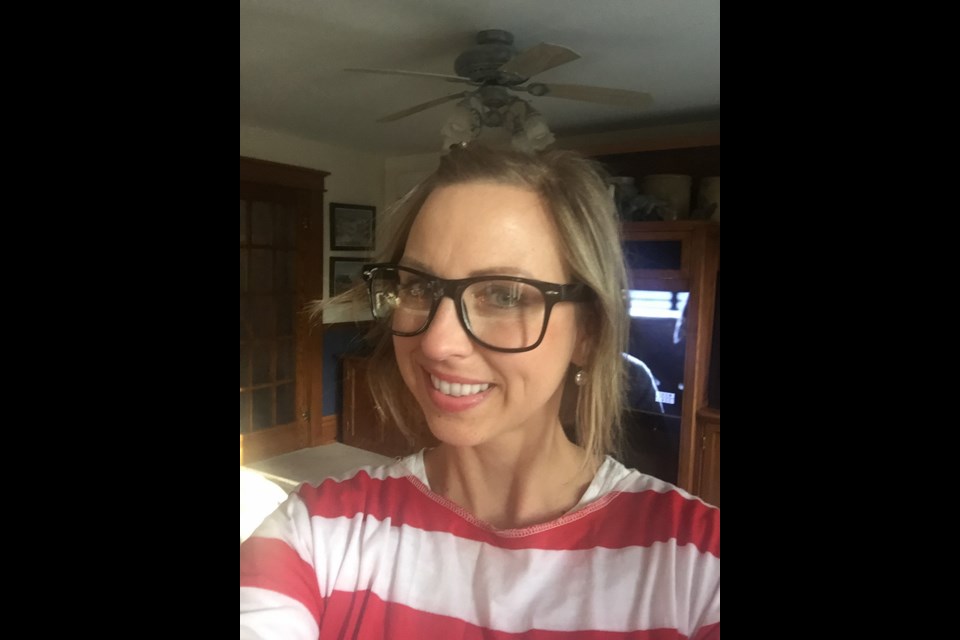This past summer, the Sault’s Andrea Pietramale, 35, was diagnosed with breast cancer.
Her diagnosis came Aug. 1, her right breast removed Aug. 16.
Currently undergoing follow up chemotherapy treatments, Andrea told SooToday “being a young woman and given the news of having cancer is tough, but then realizing that one of the major side effects of chemotherapy is losing your hair is tough as well.”
“They said ‘you’re going to lose your hair while having chemo,’ but my sister-in-law is a doctor here in the Sault who has a friend in England who was diagnosed with breast cancer at 34 who used chemo cold caps.”
Andrea began researching cold caps and decided to go online and rent ‘Arctic Cold Caps’ equipment for herself to prevent chemo-related hair loss.
“The caps (which require Andrea’s scalp to be frozen to minus 30 degrees) and the cold temperature close off the hair follicles, and because they close off, the blood that carries the chemo in your system doesn’t go to your hair roots, and therefore you keep your hair,” she explained.
“I have lost a little bit of hair over four chemo sessions, but I normally would have been bald about two months ago, so it definitely works,” said Andrea, who is scheduled to have a fifth session with a celebratory Christmas theme this week.
Doctors were skeptical, but Andrea said “now, they see me when I come in with my hair and they say ‘we never thought this would work.’”
The cost for renting the kit and caps, Andrea estimated, will be about $2,000.
“It’s absolutely worth it. I would absolutely recommend it, 100 per cent. There are days when I don’t feel good but I’m a normally hyper-positive person. My family and friends don’t have to look at me and think I’m sick because I still have my hair. It’s a big thing for me,” said Andrea.
She added a local business named i Brow Bar applied long-lasting temporary eyebrow tattoos for her to compensate for the loss of eyebrow hair, the business waiving the usual $375 fee for that process.
“It (the Arctic Cold Caps kit) comes with a cooler and has eight caps in it, a thermometer, a wide tooth comb, and the caps look like an old fashioned football helmet, with an ice gel in them. The day before my chemo I go to Praxair to get dry ice, put it in a cooler, freeze it overnight, and the day of my chemo I start the process,” Andrea said.
That process involves donning a cold cap an hour before a chemotherapy session, during the chemo session itself (which can last about two hours), then for a minimum of four hours after.
“The caps have to be changed during the process, so I have my little team, all my friends and my Mom come and help me because we have the thermometers and you have to make sure the helmets are between minus 25 and minus 30.”
She also washes her hair using cold water.
“The first time, I didn’t know how it was going to be.”
“I had three shirts on, I had my husband’s battery-heated ice fishing sweater, long johns, pants, winter boots, scarf and mitts and I was sweating uncontrollably, so now, I just wear regular clothes with jogging pants,” Andrea chuckled.
“It’s honestly not as bad as it sounds. My head gets cold but it doesn’t feel like minus 30°C. It’s just my scalp, not the rest of my body,” said Andrea, noting she does experience headaches after the cap-wearing marathon, but nothing a little warmth and Tylenol can’t help.
The current round of chemotherapy sessions for Andrea ends Jan. 9, but she has to begin a different, subsequent round of chemo treatments, to be continued until Nov. 2019 (fortunately that subsequent type of chemo does not cause hair loss).
Most importantly, the prognosis is good for Andrea, who anticipates being cancer free once all chemo is done, stating she is looking forward to returning to work as a schoolteacher.
Her attitude, as she goes through the ordeal of cancer treatment, is exceptional.
“Everyone has something going on in their lives. I was shocked at first but I regained my composure. You deal with it and you do what you have to do. The chemo is something I have to go through, and I could have just sulked and felt sorry for myself but I kept positive and kept going.”
“That’s me in general, even before I got this.”
